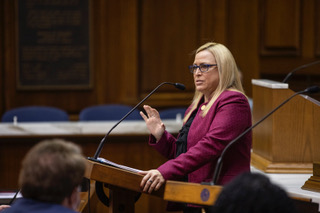STATEHOUSE (March 3, 2022) – After receiving unanimous support in the Indiana House of Representatives and Senate, legislation sponsored by State Rep. Wendy McNamara (R-Evansville) combating human trafficking and helping young victims could soon be law.
McNamara, chair of the House Courts and Criminal Code Committee, said Senate Enrolled Act 155, now pending the governor’s approval, increases the penalties for human traffickers and those who benefit from the crime while making it easier to prosecute them.
“Our goal is to eradicate human trafficking in the state of Indiana and close any loopholes that might be left, and this legislation would be a major step forward,” McNamara said. “Along with my colleagues, I will continue to look for ways to protect victims of this heinous crime, and hold human traffickers and criminals who support this industry accountable.”
The National Human Trafficking Hotline reported 140 cases of trafficking in Indiana in 2020, up from 95 in 2017.
Under current law, criminals who purchase sex from trafficked persons receive a less severe penalty than the trafficker. This legislation would increase the penalty to a Level 4 Felony, carrying a sentence of between two and 12 years in prison, which matches the penalty for traffickers. The legislation would also eliminate the a person’s defense that an underage trafficking victim gave consent for a sexual act.
“Victims of human trafficking can’t give consent, because they’re already being forced or coerced by their trafficker,” McNamara said. “It’s incredible what these women often go through, including being manipulated, exploited, abused and tortured. We have to continue to crack down on this form of modern-day slavery.”
Currently, Indiana law requires Hoosiers 15 years old or older at the time of a trial to testify in court. This legislation would allow survivors 14 years old or younger at the time of their assault to submit a video statement for court procedures if they are younger than 18 at the time of the trial.
McNamara said these protections would help young victims of any violent crime, not just human trafficking.
One Indiana father, whose name and location are withheld because protective orders are still in place, testified that his daughter was kidnapped, strangled and stabbed at age 13 and then had to face her attacker in court under the state’s current laws.
“Many kids are the victims of a sexually motivated violent crime but defendants are not charged with a sex crime because of a lack of evidence, or because the child defended him or herself to prevent the sexual assault,” he wrote in his testimony. “Let’s not indirectly punish those victims. Their trauma should not be discounted by Indiana law. My daughter endured very significant emotional and physical trauma resulting from her crime.”
This legislation would also require law enforcement agencies to report any human trafficking investigations to the Office of the Indiana Attorney General, which McNamara said would give the state a better overall view of the scope of the issue.
If someone is suspected to be a victim of human trafficking, it should be reported immediately to the National Human Trafficking Hotline at 1-888-373-7888. For more information, visit humantraffickinghotline.org.





